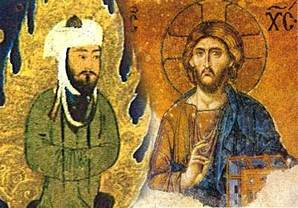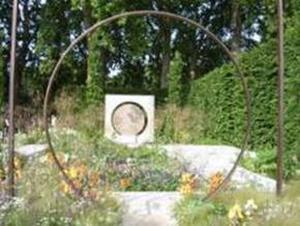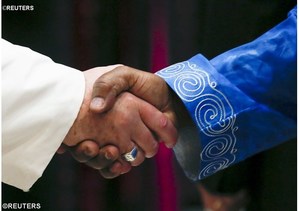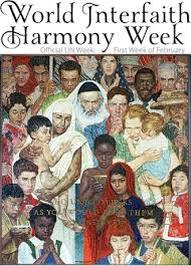
That is, I’m sure, a real possibility but the problem is that the Pauline form of Christianity is the one that has prevailed and the orthodox Christian position is that Jesus is greater than a prophet. This on-going tradition sees him as a reflection of the invisible God and the presence of God among us. Of course this doesn’t mean that Jesus can’t be a focus of unity within Judaism, Islam and Christianity. There is a growing trend within Judaism, as recent statements from both Orthodox and Reform Rabbis show, to emphasise how Jesus is perhaps the greatest and most well- known Jew of all times and how Christianity has been the cause of the spread of the knowledge of the God of Abraham, Isaac and Jacob and therefore helped Judaism in its universal mission. Muslims too have great respect for Jesus – the greatest prophet next to Mohammed – but I have often wondered how we reconcile the different versions of stories such as the birth of Jesus or the sacrifice of Isaac found in the different religions’ scriptures.
Some of the stories, such as Jesus making birds out of clay, are certainly found in some apocryphal writings which were not included in the canonical scriptures of Christianity. Mohammed was a merchant and would have come into contact with Christianity in his travels. His wife, Khadija, had a cousin who was a Nestorian monk. He was the first person to tell Mohammed of his prophetic calling. Early Muslims took refuge in the Christian kingdom of Abyssinia. It’s possible these contacts introduced Mohammed to Apocraphyl and Nestorian writings. Was Mohammed aware of them as he received the Qur’anic revelation? Is that how they got into the Qur’an? But for Muslims who believe that the Qur’an is a replica of a heavenly book and is the not just the Word of God but the Words of God it will be difficult to reconcile the Qur’anic versions with the orthodox Christian version. Will it be possible for Christians, Jews and Muslims to accept Jesus as a central figure but allow Christianity to see him as divine? Can the three religions recognise that the historical facts of the stories are not important and in fact irrelevant compared to the truth they are trying to illustrate? This is certainly a way of understanding the Christian scriptures but will it be enough for Muslims? Is it possible to find unity in the message of Jesus which relates so well with Judaism and Islam as Akyol suggests.
What all this does show is that Judaism, Christianity and Islam are part of the one story of God’s interaction in human history. They all claim to be children of Abraham and receptive of God’s revelation in history. Baha’is too claim this. Their founder Baha’u’llah came from the Muslim religion before he received his unique revelation but somehow Baha’is are often missed out when we talk of the Abrahamic faiths though there’s no doubt their story is also part of the Abrahamic story.
It also shows the interrelatedness of the faiths – true of the eastern religions as well as the Abrahamic ones. We are used to thinking about the interrelatedness of human beings and creation but it’s also true of religious systems. No religion is discrete, independent, separate. Each one has emerged from another, reflects in some way the religion and traditions which have given it birth, is influenced by the culture into which it’s born and affected by its on-going relationship with other cultures and faiths. People of faith are indeed related to one another, belong in one community of faith. If we truly believed and understood this perhaps we could relate to one another as brothers and sisters, rejoicing in our commonalities while respecting our differences. That would indeed form a bridge between the faiths.





 RSS Feed
RSS Feed
